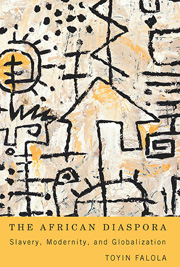Book contents
- Frontmatter
- Dedication
- Contents
- Preface and Acknowledgments
- Introduction: The Old and New African Diaspora
- Part 1 The Old Diaspora: Slavery and Identity Politics
- 1 Africa and Slavery in a Transnational Context
- 2 The Slave Mutiny of 1839: The Colonization of Memory and Spaces
- 3 The Centralization of Africa and the Intellectualization of Blackness
- 4 Communalism, Africanism, and Pan-Africanism
- Part 2 An African Case Study: Yoruba Ethnicity in the Diaspora
- Part 3 The New Diaspora: Transnationalism and Globalization
- Postscript: United States Foreign Policy on Africa in the Twenty-First Century
- Notes
- Bibliography
- Index
1 - Africa and Slavery in a Transnational Context
from Part 1 - The Old Diaspora: Slavery and Identity Politics
Published online by Cambridge University Press: 05 September 2013
- Frontmatter
- Dedication
- Contents
- Preface and Acknowledgments
- Introduction: The Old and New African Diaspora
- Part 1 The Old Diaspora: Slavery and Identity Politics
- 1 Africa and Slavery in a Transnational Context
- 2 The Slave Mutiny of 1839: The Colonization of Memory and Spaces
- 3 The Centralization of Africa and the Intellectualization of Blackness
- 4 Communalism, Africanism, and Pan-Africanism
- Part 2 An African Case Study: Yoruba Ethnicity in the Diaspora
- Part 3 The New Diaspora: Transnationalism and Globalization
- Postscript: United States Foreign Policy on Africa in the Twenty-First Century
- Notes
- Bibliography
- Index
Summary
No topic illustrates Africa's position in the international system better than slavery, both as an institution and as a system of commerce. While chattel slavery is virtually dead in most parts of the world, new categories and processes of exploitation have emerged displaying characteristics that defined slavery in the past. The Atlantic slave trade, colonialism, the Cold War, and the lingering economic status of Africa as a dependent continent are some of the most critical historical developments that tie Africa to the rest of the world. Of those ties, slavery and the slave trade remain the most significant; their effect linger to this day. A social institution connected with commerce produced a culture that highlighted the complexity and dangers of globalization. In any discussion of slavery, the transatlantic slave trade looms large. No other cases of human trafficking compare with the transatlantic slave trade in its magnitude and impact. Many will agree with David Northrup's summary of its centrality:
First, it brought many millions of Africans to the Americas (four times the number of European immigrants who settled there down to about 1820), leaving a permanent cultural and genetic imprint on many parts of the New World. Second, the creation of slave labor systems in the New World was associated with the first phase of European expansion and the rise of capitalism. Third, the end of the slave trade was the subject of a massive abolitionist campaign that scholars widely have seen as one of the great turning points in Western moral consciousness. Finally, the Atlantic slave trade has been seen not only as affecting Africa during the four centuries of its existence but also as leading to the later European takeover of the continent and causing its present- day underdevelopment.
- Type
- Chapter
- Information
- The African DiasporaSlavery, Modernity, and Globalization, pp. 29 - 52Publisher: Boydell & BrewerPrint publication year: 2013



